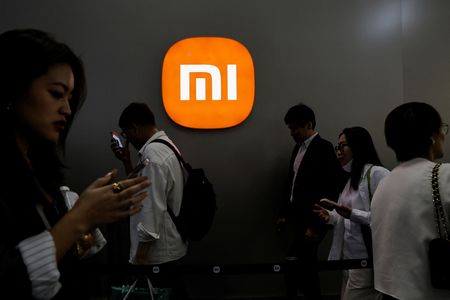By Che Pan and Brenda Goh
BEIJING (Reuters) -China’s Xiaomi warned on Tuesday that consumers were likely to see further hikes in smartphone prices next year due to soaring costs of memory chips while acknowledging such a measure would not fully offset the costs.
Global memory chip prices are climbing due to surging demand for units for artificial intelligence servers as companies race to build out data centres. Chipmakers like Samsung have shifted capacity toward high‑bandwidth memory (HBM) and trimmed output for those chips used in products including mobile phones.
“I expect pressure to be much heavier next year than this year,” Xiaomi President Lu Weibing told reporters on an earnings conference call on Tuesday, referring to the rising costs of memory chips.
“Overall, consumers are likely to see a sizeable rise in product retail prices. Some of the pressure may have to be addressed through price hikes, but price increases alone won’t be enough to digest it,” he added.
ELECTRIC CARS, AI HELP BOOST GROUP REVENUE
Lu said last month that soaring memory chip prices had pushed up smartphone costs, after some consumers expressed disappointment at the price of its new Redmi K90. During the third quarter, Xiaomi shipped 43.3 million handsets worldwide, up 0.5% year-on-year, keeping Xiaomi in third place worldwide with a 13.6% market share, according to its latest financial report citing research company Omdia.
Total revenue for the quarter ended September rose 22.3% to 113.1 billion yuan ($16 billion), below the 116.5 billion yuan average of analyst estimates compiled by LSEG.
Hong Kong-listed shares in Xiaomi, which also makes electric vehicles and home appliances, closed down 2.81%. The stock has risen 18.2% so far this year.
It said in a statement that revenue growth was driven by EV, AI and other new initiatives, which accounted for 25% of its total revenue. Xiaomi’s adjusted net profit jumped 80.9% year-on-year to 11.3 billion yuan in the third quarter, exceeding the average estimate of 10.3 billion yuan, according to LSEG data.
The world’s third-largest smartphone maker has stuck with its foray into EVs. The EV business generated 28.3 billion yuan in revenue in the September quarter, up from 20.6 billion yuan in the second quarter and 18.1 billion yuan in the first. Xiaomi said its EV, AI, and other new initiatives turned around to an operating profit of 700 million yuan for the first time in the September quarter. The company delivered 108,796 EVs in the quarter, as it began shipping its second model, the YU7 electric SUV, after the vehicle’s launch in June. This was a rise from 81,300 in the second quarter, which did not include any YU7 sales.
($1 = 7.1110 Chinese yuan renminbi)
(Reporting by Che Pan and Brenda Goh; Editing by Louise Heavens and Emelia Sithole-Matarise)










